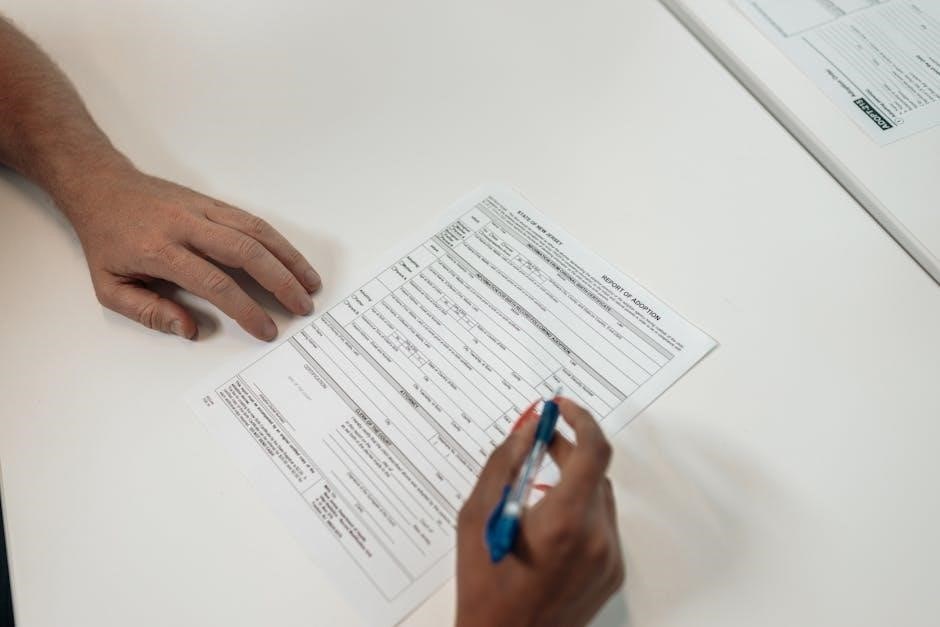
Overview of AVOs in NSW
An Apprehended Violence Order (AVO) is a court order issued in NSW to protect individuals from violence, harassment, or intimidation. It is commonly sought in cases involving relationship breakdowns or disputes, often without physical violence. AVOs are designed to provide legal protection to the protected person by imposing conditions on the defendant’s behavior. The order can be tailored to specific circumstances and is enforced by NSW courts to ensure safety and prevent further incidents.
1.1 What is an AVO?
An Apprehended Violence Order (AVO) is a court-issued order in New South Wales designed to protect individuals from violence, harassment, or intimidation. It is not a criminal charge but aims to prevent future harm by imposing conditions on the defendant’s behavior. AVOs are commonly sought in cases involving domestic disputes, relationship breakdowns, or workplace conflicts. There are two types: Apprehended Domestic Violence Orders (ADVOs) for individuals in domestic relationships and Apprehended Personal Violence Orders (APVOs) for all other situations. To obtain an AVO, an application must be made to the court, often supported by evidence such as witness statements or medical records. The court will assess whether there are reasonable grounds to believe the protected person is at risk of violence. Once granted, breaching an AVO can result in criminal charges, making it a serious legal matter.
1.2 Types of AVOs
In NSW, there are two primary types of Apprehended Violence Orders (AVOs): Apprehended Domestic Violence Orders (ADVOs) and Apprehended Personal Violence Orders (APVOs). An ADVO is specifically for individuals in domestic relationships, such as partners, family members, or carers, and is the most common type. An APVO, on the other hand, applies to all other situations, including workplace disputes, neighbor conflicts, or threats from acquaintances. Additionally, AVOs can be categorized as interim, provisional, or final. Interim AVOs provide immediate protection until a court hearing, while final AVOs are long-term orders. Provisional AVOs are issued by police in emergency situations. Each type is tailored to address specific circumstances, ensuring the protected person receives appropriate legal protection from violence or harassment.

Grounds for Varying an AVO
An AVO can be varied due to a change in circumstances, if it is in the interests of justice, or if the protected person is a child and it is appropriate.
2.1 Reasons to Vary an AVO

An AVO can be varied due to a change in circumstances, such as altered living arrangements, work commitments, or if the order is no longer necessary. It may also be varied if the court determines it is in the interests of justice or fairness. For instance, if the protected person is a child, the court may consider variations if it aligns with the child’s best interests. Additionally, if the conditions of the AVO are deemed too restrictive or no longer relevant, the court may adjust them. The court will assess whether the original reasons for the AVO still apply and whether varying the order would provide a more practical or fair solution for all parties involved. The variation process ensures the order remains effective and appropriate over time.

2.2 Who Can Apply to Vary an AVO
In NSW, various parties can apply to vary an Apprehended Violence Order (AVO). The defendant, who is subject to the order, can apply if they believe the conditions are no longer necessary or require adjustment. The protected person, or someone on their behalf, such as a legal representative, can also seek variations, especially if circumstances have changed. Additionally, the police, who may have initially applied for the AVO, can request changes if they deem it appropriate. In some cases, other interested parties, such as a parent or guardian of a protected child, may also apply. The court will consider these applications and may grant permission if it is in the interests of justice or due to significant changes in circumstances. The process involves completing the correct forms and providing evidence to support the request for variation.
2.3 Evidence Required for Variation
To successfully apply for a variation of an AVO in NSW, the applicant must provide sufficient evidence to support their request. This evidence should demonstrate why the order should be modified or revoked. Common types of evidence include witness statements, medical records, photographs, or any other documentation relevant to the case. If the application involves a child as a protected person, additional evidence may be required to show that the variation is in the child’s best interests. The court will carefully evaluate the evidence to determine if the requested changes are justified. It is essential to provide detailed and credible information to strengthen the application. The evidence must clearly address the reasons for seeking the variation and demonstrate how the current order is no longer necessary or should be adjusted. The court’s decision will be based on the merits of the evidence presented.

Process to Vary an AVO
The process begins with obtaining the Application to Vary or Revoke Apprehended Violence Order form from the Local Court Registry. Once completed, the form must be filed with the court and served on all relevant parties.
3.1 Obtaining the Application Form
To initiate the process of varying an AVO, you must first obtain the correct application form. The Application to Vary or Revoke Apprehended Violence Order form is not available online and must be collected in person from the registry department of your local NSW court. This form is specifically designed for requesting changes to or the cancellation of an existing AVO. Once you have the form, it is crucial to carefully review the instructions provided to ensure you understand the requirements. The form will ask for details about the existing AVO, the reasons for the variation, and any supporting evidence. If the AVO involves a child as a protected person, additional permissions from the court may be required. Legal advice is strongly recommended to navigate this process effectively and ensure compliance with all legal requirements.
3.2 Completing the Application Form
Once you have obtained the Application to Vary or Revoke Apprehended Violence Order form, you must complete it accurately and thoroughly. The form requires detailed information about the existing AVO, including the case number, names of all parties involved, and the specific conditions you wish to vary or revoke. You must clearly outline the reasons for your application, such as changes in circumstances or other relevant factors. Supporting evidence, like witness statements or documents, should be referenced to strengthen your case. If the AVO involves a child as a protected person, additional permissions from the court may be necessary. It is essential to follow the instructions provided with the form and seek legal advice to ensure your application is completed correctly and effectively. Proper completion of the form is crucial for a successful submission and court consideration.
3.3 Filing the Application
After completing the application form, you must file it with the appropriate court registry. For Provisional or Interim AVOs, the application should be filed at the court handling your case. For Final AVOs, you can file the application at any Local Court in NSW, not necessarily the court that issued the original order. The court staff will assist in lodging the form and provide a date for the matter to be mentioned in court. Once filed, the application is processed, and a hearing date is assigned. It is crucial to ensure the form is correctly lodged, as failure to do so may delay or invalidate your request. The court will then review your application and supporting evidence before making a decision. Proper filing ensures your case is heard and considered by the court in a timely manner.
3.4 Serving the Application
Once the application to vary or revoke an AVO is filed, it must be served on all relevant parties. If the police applied for the AVO, a copy of the application must be served on them. Additionally, the defendant and any protected persons must also receive a copy of the application. The application must be served personally unless the court orders an alternative method. This ensures that all parties are informed of the proceedings and have an opportunity to respond. Failure to properly serve the application can result in delays or the dismissal of your request. Court staff can assist with the process, but it is your responsibility to ensure the application is served correctly. Proper service is a critical step in the legal process, as it ensures fairness and transparency for all parties involved. Timely and correct service is essential for the court to proceed with your application.

Legal Considerations
Legal advice is crucial when applying to vary an AVO, as the process can be complex. The court will assess whether changes are in the interests of justice. Breaching an AVO can lead to criminal charges, emphasizing the importance of compliance and understanding the legal implications.
4.1 Court’s Role in Variation

The court plays a critical role in varying an AVO, ensuring fairness and justice. It assesses applications based on changed circumstances, evidence, and the interests of justice. The court may modify conditions, revoke the order, or leave it unchanged. For cases involving children as protected persons, permission is required to vary or revoke the order under section 72B of the Crimes (Domestic and Personal Violence) Act 2007. The court prioritizes the safety and well-being of the protected person while balancing the rights of the defendant. Legal representation is recommended to navigate the complexities of the process effectively.
4.2 Importance of Legal Advice
Seeking legal advice is crucial when applying to vary or revoke an AVO. The process is legally complex, and incorrect or incomplete applications can lead to delays or unfavorable outcomes. A lawyer can guide you through the requirements, ensuring the application is properly completed and supported by sufficient evidence. Legal representation helps you understand your rights, the court’s expectations, and the potential consequences of your application. Additionally, legal advice is essential for navigating nuanced situations, such as when children are protected persons, which may require court permission to proceed. Lawyers can also advocate on your behalf in court, ensuring your case is presented effectively. Given the stakes involved, professional legal guidance is highly recommended to maximize the likelihood of a successful outcome and avoid potential pitfalls.
4.3 Consequences of Breaching an AVO
Breaching an AVO is a serious offense with significant legal consequences. If the defendant violates the conditions of the order, they may face criminal charges, fines, or even imprisonment. A breach can also result in the police taking immediate action, including arresting the defendant without a warrant. Additionally, breaching an AVO can lead to a criminal record, which may appear on a police check and impact future employment, travel, or other opportunities. The court takes breaches seriously, as they undermine the purpose of the order, which is to protect the safety and well-being of the protected person. Furthermore, a breach can strengthen the protected person’s case if they oppose any future applications to vary or revoke the order. Understanding these consequences highlights the importance of adhering to the conditions of an AVO and seeking legal advice if issues arise.
Varying or revoking an AVO in NSW is a complex legal process that requires careful consideration and adherence to court procedures. Completing the correct application form and providing sufficient evidence are crucial steps to ensure the court considers the request. Legal advice is highly recommended to navigate the process effectively, as the consequences of breaching an AVO can be severe, including criminal charges and imprisonment. Understanding the legal framework and the court’s role in balancing safety and fairness is essential for all parties involved. By following the proper steps and seeking professional guidance, individuals can address their concerns and work toward a resolution that aligns with the law and their specific circumstances.